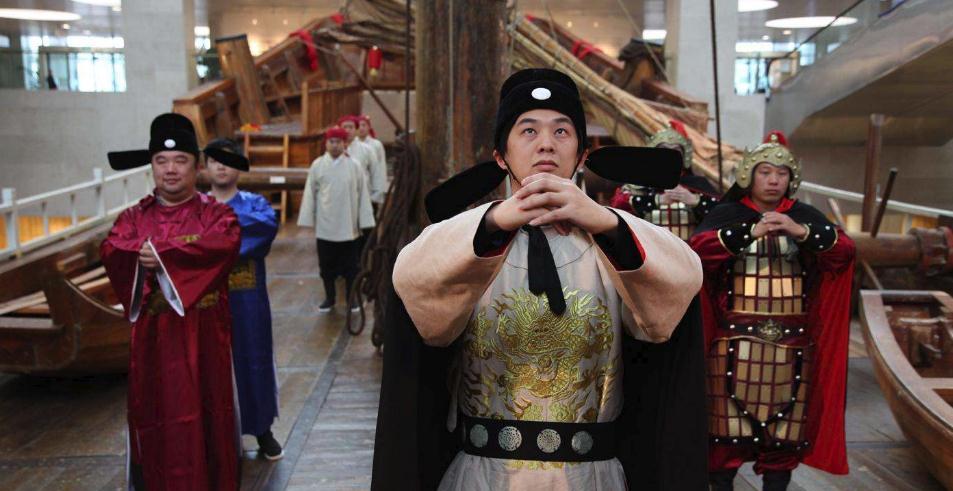Mentioning Zheng He's voyage to the West during the Ming Dynasty is a milestone in the history of ancient navigation. From 1405 to 1424, Zheng He traveled south to the West six times as an envoy of the Ming Dynasty. Zheng He spread the power of the Ming Dynasty among various countries, and compiled what he saw and heard along the way into a book, which completely opened up trade exchanges between China and Nanyang, which can be described as a great achievement. However, when Zhu Yuanzhang established the Ming Dynasty, he once "ordered that the plates should not go to the sea." The sea ban was not completely abolished by the British until 1840, so why did Zhu Yuanzhang implement the sea ban? With the explicit prohibition of large ships from going to sea, how could Zheng He go to the West?

The author will first briefly introduce the basic content of the Ming Dynasty sea ban. Since ancient times, China has been "relying on mountains to eat mountains, relying on water to draft water", but in ancient times, because the shipping industry was not developed, coupled with the fact that the ancients were more superstitious, most of them were still based on the agricultural economy, and the demand for the ocean was not too big. To put it mildly, today's Xiamen, Guangdong Zhuhai and other places in ancient times, are called barbaric places. In addition to the kingdom in its heyday, it was necessary to send envoys to the sea to promote the prestige of our country, basically the ancestors still relied on one acre and three points of land to eat, so agricultural production was the most important economic model.
Before the Yuan Dynasty, there was basically no trade on the sea, although the Song Dynasty sent envoy ships to the sea many times to send China's silk, porcelain, tea and so on overseas. However, during the Ming Dynasty, the civilian smuggling industry developed rapidly, especially the pirate armed forces at sea were more rampant, and China's southern coast and other small Western countries monopolized maritime trade. Coupled with the unpredictable maritime climate, there was no GPS navigation technology in ancient times. Therefore, after the Song Dynasty, maritime trade was already dispensable. Zhu Yuanzhang was in the third year after the establishment of the Ming Dynasty, that is, in 1370. He ordered the abolition of the dynastic dock agency, which was dedicated to maritime trade. Until 1394, Zhu Yuanzhang completely abolished maritime trade and forbade Chinese to go to the sea.
However, Lao Zhu did not overturn everything with one shot, and he still allowed foreigners to take their own ships and come to the Ming Dynasty to study and observe. Zhu Yuanzhang's implementation of the sea ban, the key is still to maintain his own rule, the folk also spread that "pieces of board are not allowed to go to the sea", once the officials know that someone has gone to the sea privately, the consequences will be very serious. Zhu Yuanzhang implemented this sea ban on the country, mainly to crack down on private maritime trade. In ancient times, the emperor was afraid that those who were powerful and powerful would easily hinder their rule by taking ships overseas and other small countries to form a large armed force by enlisting local forces. In the final analysis, it is still a closed country and a relatively small peasant consciousness. But why, after Zhu Yuanzhang implemented the Ming Dynasty sea ban, Chengzu Zhu Di was still able to let Zheng He go to the West?
In fact, Zheng He's voyage to the West was a special case, during the Zhu Yuanzhang period, Ming Taizu actively submitted gang relations with surrounding feudal states. However, due to the influence of the Battle of Jingnan, Zhu Yuanzhang's desire to contact other small countries through the sea was temporarily stranded. After Zhu Di won the throne, he also inherited his father's legacy. Before Zheng He went to the West, Zhu Di sent other envoys to many small countries in Southeast Asia in 1403. By two years later, the Ming Dynasty was completely on the right track, and agriculture, handicrafts, and other aspects of the economy had developed by leaps and bounds. Zhu Di also hopes to form a model of peaceful diplomacy with other small countries through large-scale voyages to the West. At the same time, Zhu Di can also obtain a detailed maritime route map through this move.
Therefore, Zheng He's voyage to the West has many advantages. First, the Ming Dynasty can clearly understand the living background of many small countries and local specialties. At the same time, we can learn some specific conditions in the surrounding waters of our country. Finally, through the alliance with other small countries, the Ming Dynasty can "attack and retreat.". Zheng He's going to the West was the meaning of the supreme ruler of the Ming Dynasty, and naturally the Ming Dynasty's sea ban could not be talked about.
Among them, it is also rumored that the reason why Zhu Di will let Zheng He go to the West many times is that he still wants to find the whereabouts of his nephew Emperor Jianwen. Of course, these are folk histories and cannot be used as orthodox references. Therefore, the sea ban imposed by Zhu Yuanzhang also had special circumstances. Not only Zheng He went to the West. In the Longqing period, the Ming Dynasty also briefly opened the port, which was based on the different needs of each stage and each ruler, which caused some loosening of the sea ban. After all, "rules are dead, people are alive."
Reference: Mingshi